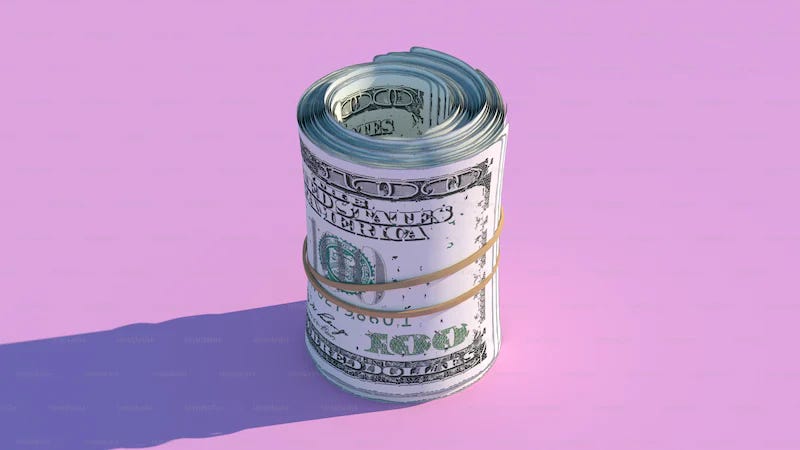Paradoxically, money has been an intricate yet uncomfortable subject of discussion embedded in every aspect of our lives for centuries.
As with most things, the more familiar you become with it, the less intimidated you feel, resulting in smarter decisions that align with your own needs rather than the opinions of strangers online or even within your social circle.
The goal of this article is not to instantly turn you into an open book, and have you discuss every detail of your finances with anyone. We shouldn’t feel obligated to reveal every purchase, our assets, annual earnings, or net worth since our financial decisions reflect a whole host of factors including our values, priorities, short/long term goals, and more, which others may often disagree with.
Instead, understanding our triggers, how and why we react a certain way to purchases, and avoid learning about an aspect of our finances that needs improvement can teach us a whole lot more about our current financial state and help us achieve our goals much faster.
Our decisions can open a whole new world about ourselves when we pause and ask a few questions along the way. A bit of self-reflection and experimentation can go a long way. For instance, what tastes good or is considered large by someone else may be the complete opposite for you.
Wealth is the most subjective topic there is.

First Be Open With Yourself
We all have preferences and opinions, and most of us prefer not to disclose our financial choices to prevent controversy, comparison, fear, or disclose the underlying feelings behind our decisions. It’s strange how we’ll talk to our best friends about the wildest cringiest personal things yet when it comes to anything revolving around finances, awkwardness begins. Although it may seem like these nerves come from nowhere, it’s really from the inside and what you’re hiding from yourself.
$2 for a coffee may be a bargain to a friend, while may be extravagant for you. This is where money gets complicated as priorities, values, purpose, and identity are all thrown into the mix.
You know that feeling when a friend asks, out of curiosity, how much you’ve spent on something, and you both look at each other as if a debate is about to break out? Money talk is a delicate matter.
As we get older, we pick up on certain behaviors and ways of communicating, all influenced by a multitude of factors, from our environment to our education, and mainly the people around us. If you’ve grown up never mentioning money, despite it being an integral part of your life, and it’s the only thing you ever fear or question, that’s a red flag it has become a bigger issue.
Families that openly discuss their household budgets for an upcoming trip or how much they plan on saving are much likelier to have a better relationship with money and down the road, become wealthier. You can either control money, or it can control you.
The best investment you can make is learning how to manage your emotions and knowing you have control to become more comfortable. Being open about what we earn versus what we spend on are two different things, and some people are more comfortable with one or neither. What we earn represents our perceived worth, while what we spend is less controversial since there’s a sticker price and it’s the same for almost anyone.

What You Cost
Even as a self-proclaimed personal finance guru, like anyone else for obvious reasons, I won’t disclose my earnings or monthly expenses. While earnings from high-profile individuals are publicly disclosed, we can never be certain of the accuracy of those figures, as countless factors come into play plus these individuals wouldn’t publish these figures themselves!
Growing up in an immigrant household, early on I learned about the value of compound interest, consistency of healthy habits, frugality, minimalism, and about appreciation. Over the past 22 years on this planet, I’ve been exposed to a variety of financial transactions. From electronic to physical markets, every exchange involves giving up something for something deemed more valuable. Many times we realize past decisions weren’t always in our best interest after all but hopefully as we get older, we improve and start paying closer attention to where our earnings from our own pocket are going to so we can feel good about spending money not fearful.
When it came to investing, budgeting, planning, and everything in between, these topics were a core part of my everyday life at home and frequently discussed since they obviously mattered a lot. Although these discussions should be important for everyone, since finance in itself is an opaque, jargon heavy space, people tend to shy away from these topics.
In my case, there was nothing to hide from since I was curious about building my future and knew finances needed to be discussed so we could become more responsible. This perspective helped me become more comfortable with money, make better decisions, not be emotionally attached to things, stop comprising myself, and arguably the greatest factor, become more emotionally aware of my decisions.
One major misconception about achieving greater wealth or happiness is that hard work, saving and then spending on what you ‘like’ or ‘want’ will suffice. If you don’t understand the real reason on why you’re spending, it can derail your financial progress later on. If you take a hard look at where you’re spending, you’ll be shocked at how much other’s opinions come into play.

Make Your Life Easier Not Harder
Becoming comfortable with anything takes time, especially considering the emotional and mental layers, battles, wounds, and challenges behind attaining any sort of wealth. If you’re truly comfortable with your wealth, you will buy things that will make your life easier not look shinier to others.
Buying something, enjoying it, and not disclosing the sticker price or how you purchased it, especially for higher-priced items is typical but at the same time leaves a lot of questions, assumptions, and curiosities at the same time. If you see someone driving an expensive car, you may suspect they earn a ton and living their best life but in reality, maybe they just took out a $100k loan and sold their house for the Lambo! Sadly this is more common than not. Comparison is all around and is vicious but we cannot let it fool and bite us since we’ll just never know someone’s unique financial situation so focus on getting familiar with yours instead!
Money is personal, and there should be boundaries. However, if you notice any purchase or spending decision affects your mood or lifestyle, it’s worth examining what’s behind closed doors. Observe the changes in your mood, whether they get triggered when budgeting, planning your new lifestyle, or perhaps when managing your portfolio. If you already feel nervous imaging acquiring it, it will likely make you even more nervous when you actually do! For many people, including myself at times, it can be difficult to face that feeling and overcome it due to societal pressure to keep up with the Joneses.
With that in mind, here are a few ways to become more open with money between yourself, make wiser decisions, and less emotional within it all:
- Start talking about your savings goals or your plans for the future more often with your loved ones or your partner/spouse/parents and to yourself! You don’t need to dive into every detail but at least discuss your steps in savings and show accountability. See how the conversation goes. If you find yourself avoiding specific targets, ask yourself, is this because I’m embarrassed or not proud of my current financial decisions, or if there’s room for improvement in this area of my budget, how can I resolve these issues?
- Learn to negotiate and be honest with yourself and others you trust. Rarely is a price tag set in stone. This is where character and emotional intelligence come into play. If you’re peer-pressured to join your friends at a concert when you had initially planned to cut back on discretionary spending this month, be open about it and let them know it might be tough for you to join this time. What’s the worst thing that could happen if you express your desire to save? They’ll likely understand because if it doesn’t hurt your savings, you’re probably not saving enough!
- Assess your anxiety levels when making a purchase. Reflect on the last few items you bought and how they made you feel. If you didn’t feel anything or worse, why did you get them? There’s always some underlying attachment to something. If you get anxious thinking about your next trip, it’s probably not worth going on that cruise, especially if it will make you even more anxious when you have to pay off your hefty credit card bill afterward. You’ll likely enjoy the trip more if you wait a while for a better deal and more cash on the side.
There’s no secret to unlocking the power of being comfortable with money. The first step is knowing yourself. An area you’re afraid of discussing is likely your weakness. For most people, no matter their status or level, there’s always an area of our game we can improve upon. The more comfortable you become asking tough questions now, the more open and richer your life will become later on.

